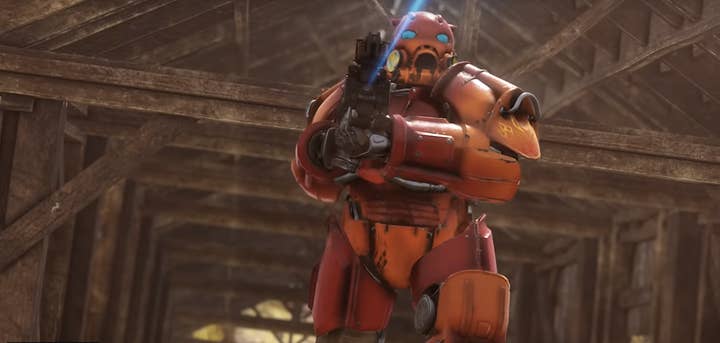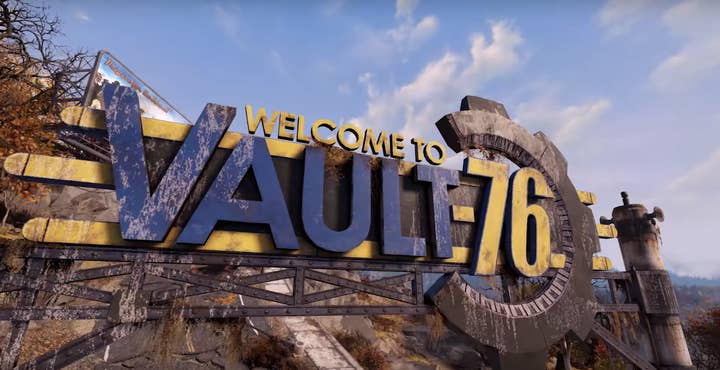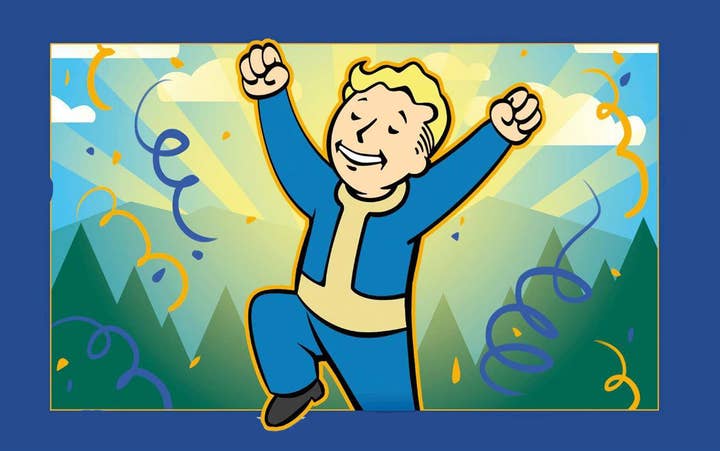Saving Fallout 76
Bethesda's Pete Hines on using the lessons from The Elder Scrolls Online to fix a rare misstep for Bethesda Game Studios
Fallout 76 is the first real test Bethesda Game Studios has faced in its 18 year history.
The studio is one of the industry greats, responsible for some of the most commercially successful RPGs ever made. And it has been consistently excellent, too; from Morrowind in 2002 to Fallout 4 in 2015, Bethesda Game Studios has rarely put a foot wrong.
Until Fallout 76.
The online debut for the Fallout brand was marred by technical issues, and was poorly received by the critics. Fans were disappointed, and sales took a hit. Fallout 76 was a rare misstep for the BGS team, which was also working on two other projects: a new IP called Starfield, and the sixth game in the Elder Scrolls series.
When the studio's figurehead, Todd Howard, took to the stage at E3 2019, he didn't talk about either of those upcoming projects. Instead, he addressed Fallout 76, revealing new content, characters and gameplay features -- primarily a battle royale mode. It may not have been as exciting for those in the room, but the clear focus for BGS is to fix the problems of its existing project.
"There is an element of pride -- not in a 'we don't quit and give up' way, but we need to show and prove that we are going to stick with it"
Bethesda's senior vice president of global marketing and communications Pete Hines says there was never any other choice than to keep going with Fallout 76.
"It's just in our DNA," he says. "I appreciate there might be folks who are tempted to throw up their hands and [call it quits], but that's just not how we're wired. We believed in it. The fact that it didn't go the way we expected and it had issues that maybe we should have foreseen and should have planned for doesn't mean we didn't believe in what the game was and could become."
Of course, there's a reputation element to consider, too. In 2010, Square Enix released Final Fantasy XIV, another online game under a huge brand that disappointed fans. Ultimately, it decided to rebuild the entire project, leading to the much improved Final Fantasy XIV: A Realm Reborn in 2014. Square Enix said at the time that the investment was necessary as the brand's reputation was at stake. Is that another motivation for Bethesda's on-going commitment to Fallout 76?
"For sure, that had some amount to do with it," Hines agrees. "BGS is a team that's made a lot of very highly successful things. Still, in my opinion, they are one of the most respected and decorated studios in the world. There is an element of pride -- not in a 'we don't quit and give up' way, but we need to show and prove that we are going to stick with it, and that we don't just hit some adversity and throw up our hands and go, 'Oh this is too hard, let's do something else.' That's not how we think about things, either as a publisher or as a studio."

Although Fallout 76 was built on much the same tech as Fallout 4, it was still a hugely ambitious project for BGS. It had never made a big online multiplayer game before, and although it did boast some experts on the team (especially from the new Bethesda Games Studios Austin), it was still a journey into the unknown.
"There are plenty of people on the team who have done this and that," Hines begins. "But it's still not the same, right? To bring all those things together onto a product that you're all working on and shipping together; some of those past lessons are useful, but they don't replace a whole team working on a thing."
"We're trying to offer up more transparency and communication, and being more visible than we used to be in Bethesda Game Studios"
Bethesda, the publisher, has been in a situation similar to this before. In 2014, it published ZeniMax Online Studios' The Elder Scrolls Online. The response was muted and there were some teething problems. Over the following years, the team reacted with a new post-launch plan and a new business model. The result? ESO recovered, the fanbase grew, and the title remains popular to this day.
"From a publisher standpoint, any number of folks from my team -- myself included -- were like, 'I have seen this movie before,'" Hines says. "We put something out on social media, and we see all the comments about how nobody plays this game, so we should stop talking about it. I heard all of that on Elder Scrolls Online when it launched.
"For [the Fallout team], none of those -- literally none of those -- folks worked on Elder Scrolls Online, so it's definitely new to them. But it definitely wasn't new at all for us.

"We as a marketing, community and PR team try and take a lot of what we learned working on ESO and came to them with things that we think we ought to do that we're not doing -- whether it's the Inside the Vaults [blog updates] that we do, or the way we approach patch notes. They're just different to the way they've done patch notes before. We're trying to offer up more transparency and communication, and being more visible than we used to be in the Bethesda Game Studios threads, forums and subreddits.
"Ultimately, it's down to the team. Communication is great, but if the game isn't improving then it doesn't really mean anything. It really came down to that team putting in the work, because we by no means consider ourselves done. There are lots that we want to do, but the game is making improvements and coming out with cool stuff that people seem to really take to.
"That stuff -- like with Elder Scrolls Online -- improved the value and the commitment, particularly for those who have stayed with us from the start, right? There's a lot of them, and they not only stuck with us when we were dealing with problems and issues, but also stuck with us when it was very popular and very trendy to kick us while we were down and pile on Fallout 76. They stuck to their guns and weren't swayed by people.
"We've learnt a lot. It's really gratifying, because with [Battle Royale mode] Nuclear Winter, the team said, 'This is a thing we want to do, which is a different take on PvP in the game.' We all had fun playing it, but we were keenly aware that battle royale will have a lot of people rolling their eyes -- 'Oh, here we go again.' But it was like, yeah, but if it's a good idea and it's fun and we think our players are going to like it, then we just have to suck it up and be able to take that and hope that people try it.
"The response from the last few days has been: 'I thought I'd hate this but I'm having a blast.' That feels like a pretty good win, to do something that felt risky because it was almost a meme. But they've taken a different approach to it."
Hines concludes: "That does feel very much like ESO, where you have to make changes and pivot. That game underwent some pretty fundamental changes. We realised that this game can't succeed with the way that we envisioned. We have to change and listen to what players are saying. Bethesda Game Studios has taken a page out of that notebook and said, 'Well alright, we're going to continue to listen and figure out what people want more of."

